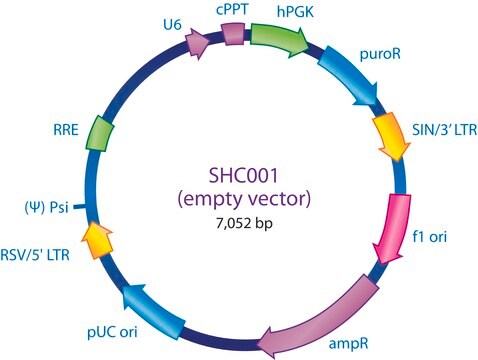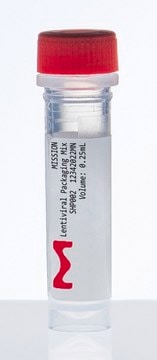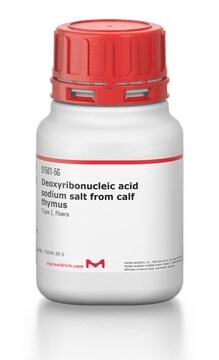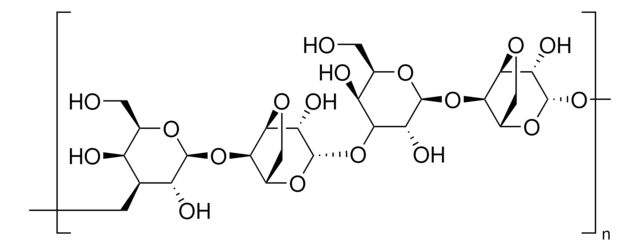Alle Fotos(1)
Wichtige Dokumente
D9893
pBR322 Plasmid DNA from E. coli RRI
lyophilized powder
Anmeldenzur Ansicht organisationsspezifischer und vertraglich vereinbarter Preise
Alle Fotos(1)
About This Item
CAS-Nummer:
EG-Nummer:
MDL-Nummer:
UNSPSC-Code:
12352200
eCl@ss:
32160414
NACRES:
NA.52
Empfohlene Produkte
Biologische Quelle
Escherichia coli
Qualitätsniveau
Qualität
for molecular biology
Form
lyophilized powder
Mol-Gew.
2.9 MDa
4363 bp
Lagertemp.
2-8°C
Suchen Sie nach ähnlichen Produkten? Aufrufen Leitfaden zum Produktvergleich
Allgemeine Beschreibung
Plasmid pBR322 was one of the first multipurpose cloning vectors constructed for use in E. coli. This plasmid is derived from the ColE1-type plasmid pMB1 and shares the same type of replication mechanism and controls as ColE1 and relatives. Plasmid pBR322 confers resistance to ampicillin and tetracycline. The plasmid sequence has been published.
The plasmid has unique restriction sites within the gene for ampicillin resistance (Pst I, Pvu I, and Sca I), within the gene for tetracycline resistance (BamH I, BspM I, EcoR V, Nhe I, Nru I, Sal I, Sph I, and Xma III), and elsewhere (Aat II, Ava I, Bal I, Bsm I, BspM II, Cla I, EcoR I, Hind III, Nde I, Pvu II, Ssp I, Sty I, and Tth111 I).
The plasmid has unique restriction sites within the gene for ampicillin resistance (Pst I, Pvu I, and Sca I), within the gene for tetracycline resistance (BamH I, BspM I, EcoR V, Nhe I, Nru I, Sal I, Sph I, and Xma III), and elsewhere (Aat II, Ava I, Bal I, Bsm I, BspM II, Cla I, EcoR I, Hind III, Nde I, Pvu II, Ssp I, Sty I, and Tth111 I).
Spezifität
Unique Sites: Within the gene for ampicillin resistance: Pst I, Pvu I, Sca I; Within the gene for tetracycline resistance: BamH I, BspM I, EcoR V, Nhe I, Nru I, Sal I, Sph I, Xma III; other unique sites: Aat II, Ava I, Bal I, Bsm I, BspM II, Cla I, EcoR I, Hind III, Nde I, Pvu II, Ssp I, Sty I, Tth111 I.
Anwendung
Plasmid pBR322 was one of the first multipurpose cloning vectors constructed for use in Escherichia coli. This plasmid and derivatives have been used for a number of purposes including cloning, selection and expression of recombinant molecules, construction of shuttle vectors and vectors for nucleotide sequencing, studies of elements involved in gene expression, as plasmid DNA standards, and as a model system for studies on prokaryotic plasmid replication.
pBR322 Plasmid DNA from E. coli RRI has been used as a low molecular weight DNA to test the enzymatic activity of partially purified component from Perna viridis (Linn.) It has also been used for investigating its effect on the calcium carbonate particle morphology by scanning electron microscopy studies
Biochem./physiol. Wirkung
This plasmid is derived from the ColE1-type plasmid pMB1 and shares the same type of replication mechanism and controls as ColE1 and relatives.
Komponenten
DNA is provided as a powder, lyophilized from a solution of 1 mM Tris-HCl (pH 7.5) with 1mM NaCl and 1mM EDTA.
Sonstige Hinweise
Accession number: J01749
Accession number: J01749
Ähnliches Produkt
Produkt-Nr.
Beschreibung
Preisangaben
Lagerklassenschlüssel
11 - Combustible Solids
WGK
WGK 3
Flammpunkt (°F)
Not applicable
Flammpunkt (°C)
Not applicable
Persönliche Schutzausrüstung
Eyeshields, Gloves, type N95 (US)
Hier finden Sie alle aktuellen Versionen:
Besitzen Sie dieses Produkt bereits?
In der Dokumentenbibliothek finden Sie die Dokumentation zu den Produkten, die Sie kürzlich erworben haben.
Kunden haben sich ebenfalls angesehen
Changes in tumorigenesis- and angiogenesis-related gene transcript abundance profiles in ovarian cancer detected by tailored high density cDNA arrays.
Martoglio, A.-M., et al.
Cancer Biochemistry Biophysics, 6, 750-750 (2000)
S Iuliano et al.
Journal of chromatography. A, 972(1), 77-86 (2002-10-25)
A HPLC technique has been developed, based on hydrophobic-interaction Chromatography with a non-porous packing (TSKgel Butyl-NPR, Tosoh Biosep LLC), that allows separation of the open circular (nicked) and supercoiled forms of five DNA plasmids, ranging in size from 4 to
S Leah Etheridge et al.
PLoS genetics, 4(11), e1000259-e1000259 (2008-11-15)
Dishevelled (Dvl) proteins are important signaling components of both the canonical beta-catenin/Wnt pathway, which controls cell proliferation and patterning, and the planar cell polarity (PCP) pathway, which coordinates cell polarity within a sheet of cells and also directs convergent extension
Unser Team von Wissenschaftlern verfügt über Erfahrung in allen Forschungsbereichen einschließlich Life Science, Materialwissenschaften, chemischer Synthese, Chromatographie, Analytik und vielen mehr..
Setzen Sie sich mit dem technischen Dienst in Verbindung.










